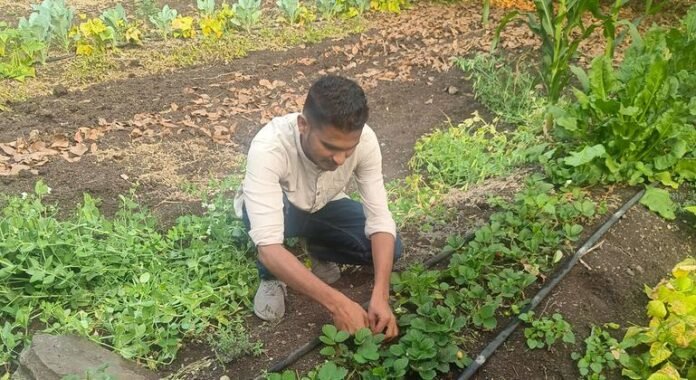The United Nations Convention to Combat Desertification (UNCCD) has selected 10 “Land Heroes” under the age of 35 from around the world.
Through their actions and ideas, these youth have presented solutions for sustainable land management at a time when threats of desertification and land degradation are increasing globally.
The 16th session of the Global Conference on Combating Desertification (COP16) is underway in Riyadh.
In the meantime, meet the Bhumi Nayaks of 2024 to learn how they can be agents of change, mobilize other young people, provide guidance and demonstrate the transformative power of collective effort.
Siddhesh Sakor, India
Siddhesh Sakor has seen up close the economic hardships of farmers and their families. He himself grew up “in a poor peasant family”.
His organization is Agro Rangers It mainly works to prevent soil erosion, which directly affects land productivity and farmers’ livelihood.
Soil erosion is often caused by inappropriate use, mismanagement, erosion, flooding, desertification and pollution by chemicals.
Siddhesh Sakore’s dream is to create livelihood opportunities for farmers, especially in the drought-prone areas of Pune. He is working to improve the conditions of farmers by switching from chemical farming to organic agroforestry practices.
“At AgroRangers we believe that the fight against desertification and drought starts with sustainable, community-based farming practices and agroforestry innovations.”
“We’re revitalizing and protecting the soil by providing farmers with the knowledge and tools to integrate plants and crops, preparing the land for a stronger and more sustainable future.”
Rokiatu Traore, Mali
Rokiatu Traore considers himself a “green entrepreneur” and runs a social enterprise based on the moringa tree in Mali.

In this, he has trained over a hundred women to make products from 20,000 moringa trees. These products include organic teas, powders, oils, soaps, spices and baby food, which are exported to more than seven countries.
In 2023, Rokiatu Traore produced 150,000 drought-resistant moringa trees, sprouted from moringa seeds, for 5,000 women and young farmers.
“A seed is a latent life. If it is given water, soil and protection, it can provide permanent solutions to the problems of desertification, women’s poverty and malnutrition,” she said.
His plans for the future are very ambitious. She wants to establish a network of women producing millions of moringa by 2030.
It also intends to plant 1 crore moringa trees and export moringa-based products to national, regional and international markets.
He believes that “nothing is impossible with a strong will.”
Takudzwa Ashley Mlambo, Zimbabwe
For Takudzwa Ashley Mlambo, planting trees is an important part of efforts to restore land and prevent desertification.

His youth-run organization ‘Forestry and Citrus Research (to be done) The goal is to plant and monitor one billion trees in Zimbabwe.
Describing himself as a “disruptive innovator”, he uses artificial intelligence and satellite technology to oversee the initiative.
They believe that afforestation is a necessary step to stem the pace of climate change and limit global temperatures to 1.5 degrees Celsius above pre-industrial levels.
He believes, “The more green, the cooler the atmosphere.”
Billy Crystal G. Dumalyang, Philippines
The Philippines is considered one of the world’s most vulnerable countries to natural disasters. Climate change has increased the intensity of storms in recent times.

Deforestation of land and watersheds around the capital, Manila, makes the city more vulnerable to extreme weather events.
Billy Crystal G. Dumaliang and the Masungi Georserve Foundation under his leadership have embarked on an ambitious reforestation initiative.
Its objective is to rehabilitate and restore the ecological balance in about 2,700 hectares of degraded catchment area around Georserve.
Their efforts are important not only to preserve the environment but also to protect Manila and surrounding areas from natural disasters.
Billy Crystal said, “Drought and land degradation are severely affecting the agriculture, well-being and daily lives of the people of the Philippines. So it is important for us to conserve biodiversity and reduce the effects of drought and climate change.”
He said his organization is engaged in activities such as conservation activities on land, restoration and inspiring storytelling related to sustainable geotourism.
Astrid Pareza, Costa Rica
Astrid Peraza believes that “it is not possible to bring about meaningful change by acting alone.”
As a young climate educator, he created a collaborative board game called “Rescuing Penguins” in Costa Rica to make this sentiment a reality.
The purpose of this game is to educate players about climate change and its solutions.

In addition, he is actively involved in a project to restore mangrove forests in this Central American country.
Efforts are being made under this project to conserve the environment and prevent desertification of coastal areas.
“To tackle problems like land desertification, it is crucial for communities to come together. Because when we talk about climate change, acting alone is not an option,” he said.

